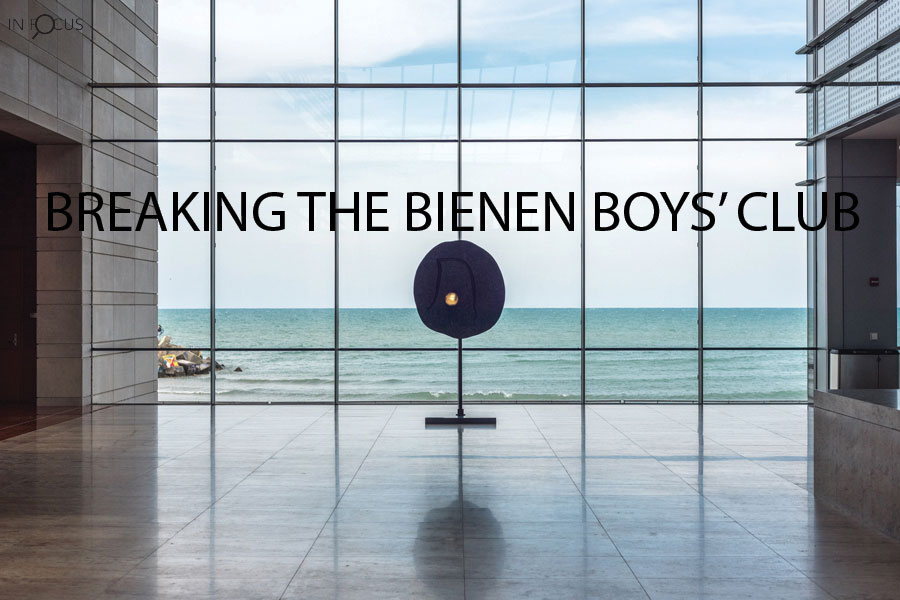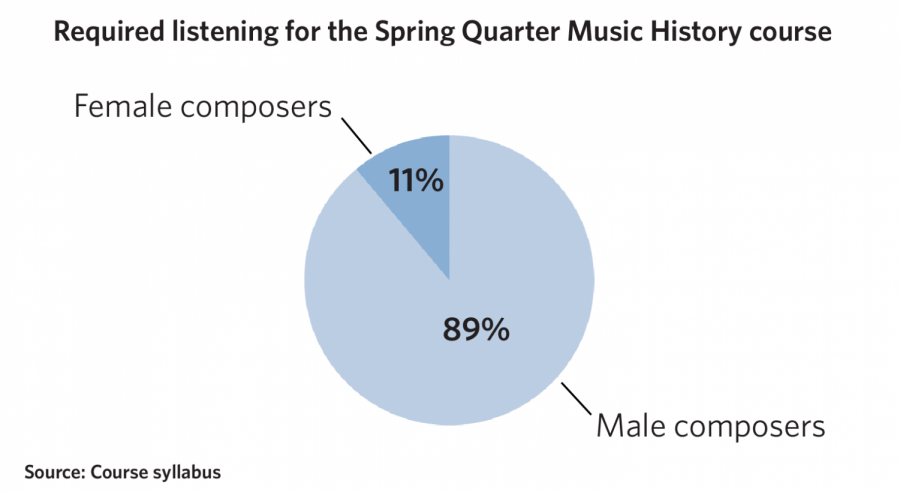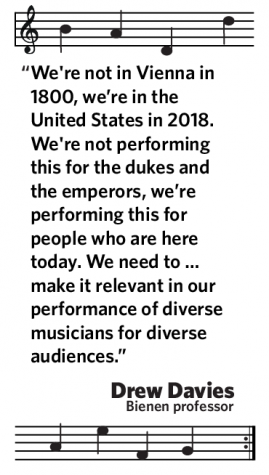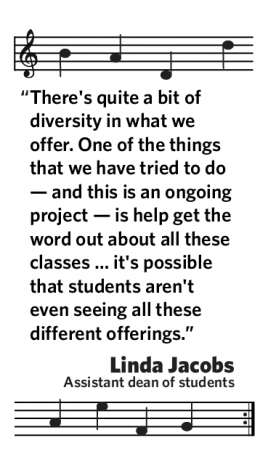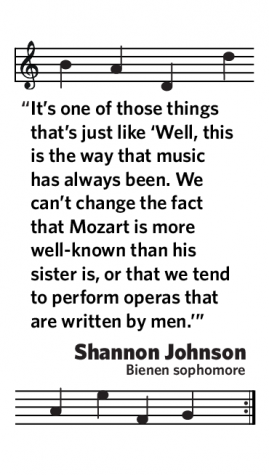In Focus: One year after petition, Bienen students, faculty push to diversify music curriculum
May 18, 2018
Since she began playing the flute in fifth grade, Julia Clipper remembered only ever playing one piece composed by a woman.
That was until this past April, when the Bienen senior, frustrated with the lack of representation in classical music, performed what she called an “intersectional feminist recital” with pieces created exclusively by women. The repertoire included contemporary African-American composer Evelyn Simpson-Curenton, 19th-century German composer Clara Schumann and contemporary Japanese composer Yuko Uebayashi.
Clipper, who studies flute performance and music education, said she handed out a list of more than 200 female composers along with the recital program to challenge the notion that female composers do not exist.
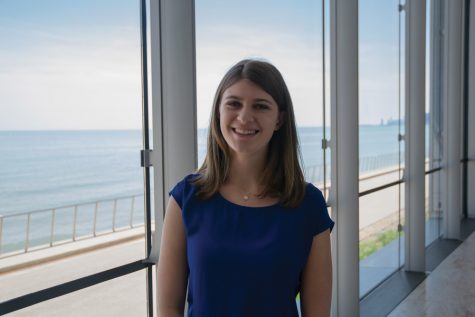
Bienen senior Julia Clipper.
People on campus still maintain this idea partly because the Bienen School of Music’s curriculum is mostly made up of white, male, European composers, Clipper said.
Many Bienen students agree. In spring 2017, more than 300 students and alumni signed a petition asking administrators to diversify the curriculum. While some professors are taking personal steps to update their class materials, students continue to look for increased representation of women and people of color in the music they learn.
Classical music is a historically male-dominated field and continues to be so today: A survey of 85 American symphony orchestras in the 2016-17 orchestral season found that music by female composers made up 1.3 percent of all music performed, and women conducted only 8.8 percent of concerts. For the 2018-19 season, New York’s Metropolitan Opera will feature 28 conductors and 27 composers — none are women.
Students said Bienen reflects this national issue, as many believe the school too often teaches only work by figures like Bach and Beethoven instead of lesser-known composers from marginalized backgrounds.
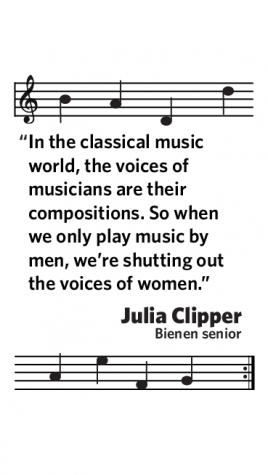
In her recital, Clipper said she chose music composed by six different women from varying time periods and backgrounds to showcase the strong pieces, not simply because they were written by women.
“In the classical music world, the voices of musicians are their compositions,” Clipper said. “So when we only play music by men, we’re shutting out the voices of women.”
Clipper said she has found that if Bienen students want to find pieces written by minority composers, they often have to look on their own because the music is not regularly taught in their classes.
“Basically in Bienen and most of the classical music world, the music that we play is written by white men who are mostly dead,” Clipper said. “It’s not representative of the voices that the current world has.”
Wanting more than ‘dead white men’
For many Bienen students, the mandatory music history sequence — three courses typically taken during sophomore year — demonstrates the music department’s lack of curricular diversity.
Bienen sophomore Shannon Johnson, who is taking Music History this year, said most of the pieces discussed in the course sequence were written by well-known “dead white men.”
“It makes me less aware of performers who aren’t white men,” Johnson said. “There could be more of an effort to just find composers that aren’t in this canon that we’re so familiar with.”
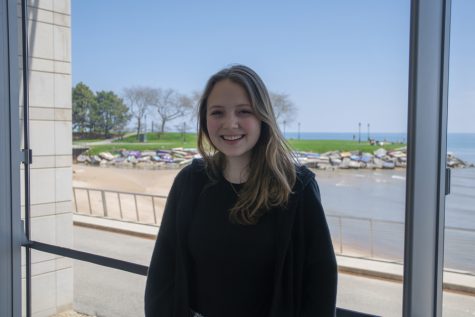
Bienen sophomore Shannon Johnson.
For one section of the Music History course this fall, male composers made up about 93 percent of the required listening on the curriculum, according to a copy of the syllabus. One Winter Quarter class fared similarly — about 95 percent of the music was written by men. And this spring, only eight of the required 73 composers and performers outlined on the course syllabus were female.
Megan Rohrer, a Bienen senior, said she remembers discussing only two or three female composers when she took the music history sequence.
“The way the curriculum was chosen says a lot about what the school or the professor thinks is valuable,” Rohrer said. “The most frustrating thing for me was just that we didn’t talk about identity at all.”
Linda Jacobs (Bienen ’97, ’04), Bienen’s assistant dean for student affairs, said she has not had any students come talk to her specifically about a lack of diversity in their core classes, but said faculty “are more than happy to talk to students about their course content.”
Bienen Prof. Scott Paulin, who currently teaches Music History, told The Daily in an email that he has tried to include a more diverse array of composers in his course, but acknowledged that, in terms of compositions, the field is primarily represented by European men.
“In teaching music history, I am most dedicated to educating students about the musical values of the past, and the ways in which, and reasons why, certain music has been ascribed value and meaning in certain historical contexts — and why other music has not, and what that tells us about our musical culture today,” Paulin said.
Petitioning administrators
Saxophonist Steven Banks (Bienen ’17) has studied at two music schools — an undergraduate program at Indiana University, and the master’s program at NU — but recently realized that he didn’t know of many female composers or composers of color. This, he said, sparked a “massive change” in his perspective on music and music education.
So, Banks created the petition urging professors and administrators to include a wider range of composers in music classes, specifically those centered on music history and theory.
“Not all of the important classical musicians throughout history were white men, yet most music students I know would not be able to name a black, Latino or Asian composer, and many may not know any female composers,” he stated in the petition.
Banks collected more than 300 signatures before he and other students presented it to Bienen Dean Toni-Marie Montgomery during a meeting at the end of Spring Quarter 2017.
Montgomery declined to comment for this story.
Even though Banks was a graduate student when he wrote the petition, he pushed for the greatest change within the undergraduate program.
“I wanted to … make sure the administration knew that it was a concern among the students that they receive a more holistic and historically accurate music education as they are going through Northwestern,” Banks said.
Bienen Prof. Drew Davies, who serves as the director of graduate music studies in Bienen and teaches a section of Music History, said many of those who signed the petition had not actually taken Music History yet.
“Some of the accusations are not true, but nonetheless they made their points,” Davies said. “It is important to be open and consistent about talking about diversity and inclusion issues — and not do it on one day, but to do it every day.”
Davies added that Bienen’s curriculum is overall more diverse than the petition signers claim, but there is still room for improvement.
Joon Park, a Bienen and Weinberg fifth-year student studying music composition and physics, joined Banks in his meeting with the dean because the petition resonated with him. Park said the issues of diversity and identity presented in the petition “rang true” for him because he is Korean.
“If you really look at the list of composers that I’m a huge fan of … I can only pick out like a handful … of Asian composers from that list,” Park said. “So there’s definitely a deficit.”
Park said there was “positive reception” from administrators at the meeting and they discussed making updates to the core curriculum that would include more traditionally underrepresented composers in course syllabuses.
Rohrer, who also attended the meeting, said administrators were helpful and told students they would continue addressing the issue at the start of this academic year.
She said the petition is well-known among Bienen students, who now seem overall more aware of the lack of diversity in music than last year. However, she added that it’s “pretty common to not engage with that conversation.”
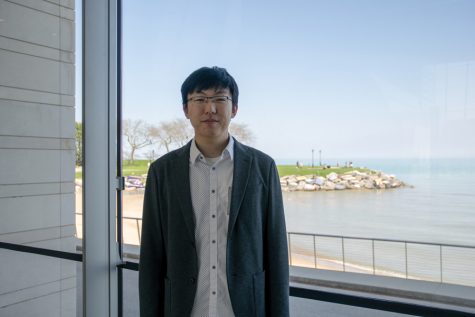
Bienen and Weinberg fifth-year student Joon Park.
“I still think most people are kind of just like, ‘Well, this is how classical music is,’” Rohrer said.
Fighting the Bienen boys’ club
“That conversation” of increasing representation felt all too necessary for Johnson when two male students announced their plans to lead a seminar this spring titled “History of Men’s A Cappella.”
The course would have required students to sing lower voice parts typically held by men.
Johnson said the student-organized seminar — announced during one of her voice major classes in the winter — was a “complete oversight” and reflected classical music’s systemic lack of diversity and opportunities for women and people of color.
“There was just this reaction in the room that was kind of like ‘Yikes,’” Johnson said of the class’ response to the course announcement. “It was something that just stuck with me for the rest of the day because it’s not OK.”
Later, the men leading the course referred to it as “A History of TTBB A Cappella,” highlighting the vocal parts tenor, baritone and bass, to make it less gendered, said Bienen junior Elio Bucky, one of the students who created the class.
Johnson and several other female-identifying students wrote a letter addressed to the course’s creators — Bucky and fellow Bienen junior Joe Badion. Both Bucky and Badion are members of all-male a cappella groups on campus.
The letter, signed by six students, said the male focus of the seminar excluded women and further perpetuated “the erasure of women in Bienen curriculum.” The letter proposed two solutions to the problems identified: change the syllabus to remove the “male-centric aspect” of the course or do not teach it.
“While we applaud our peers for taking initiative in their passions, it has raised questions of concern in regards to the exclusion of female contributions to the field, in addition to the perpetuation of a ‘Bienen Boy’s Club,’” the letter stated.
After receiving the letter, Badion said he and Bucky spent about two days discussing their options before ultimately deciding to cancel the course because they did not have enough time before Spring Quarter to appropriately alter their syllabus.
“Once we got (the letter) we kind of took a step back and realized how we were framing the class and certainly how we were selling it,” Badion said. “It made us … look at actually what was the content of it.”
Bucky added that they meant to study the “rich history” of men’s choirs, not to focus solely on men’s contributions to music. But Bucky acknowledged that they did not properly communicate their intentions, and they took “complete responsibility” for that.
Johnson said the men “responded with nothing but complete understanding” and were apologetic after receiving the letter.
About a dozen students registered for the class before it was canceled, including one female student, Bucky said. He added that he and Badion would still be interested in teaching a modified version of the course in the future, but would involve a “more diverse group of people to steer (them) in the right direction.”
“If we were to teach it, we would definitely include female voices in the planning process because the pitfall of two men teaching a class about men’s a cappella music is that there’s just a lack of representation in the planning,” Bucky said. “We wouldn’t try to do the same thing again and just hope that no one remembered.”
Still, Johnson noted that it was disheartening to see that the course had been approved by faculty and administrators with “basically no second thought.”
Jacobs, the assistant dean for student affairs, said she approved the student-organized seminar because it followed normal procedure. The seminar was given an all-clear by a faculty adviser and a department head before reaching her desk, Jacobs said. She said she did not view the class as exclusionary.
“Having courses and performance opportunities that are both diverse and inclusive would mean that a project on music written for men’s voices should also have its place at the table,” Jacobs told The Daily in an email.
She added that no one expressed concern to her about the course.
Johnson said the proposed a cappella class harkens back to a tendency to accept the lack of diversity in classical music because it has historically been ignored.
“It’s one of those things that’s just like ‘Well, this is the way that music has always been. We can’t change the fact that Mozart is more well-known than his sister is, or that we tend to perform operas that are written by men,’” Johnson said.
Finding solutions
Rohrer said she has continued to meet with musicology faculty this academic year to exchange ideas that could diversify the composers in Bienen’s curriculum.
The Bienen senior said she, along with other students, attended a faculty meeting in the fall in which professors spoke about ways they could alter their courses, like by providing sight reading examples written by composers of different backgrounds.

Bienen senior Megan Rohrer.
There are also larger-scale discussions among faculty about modifying the curriculum, Davies said. He is on a musicology committee, which was assembled by the Bienen dean during Winter Quarter to formulate and implement changes to the core curriculum within the next few years, he said.
Davies said one possible solution could come in the form of a Bienen freshman seminar course that would serve as an “open forum” on musicianship, focusing on identity and diversity.
He added that it would be a “huge advantage” for new students to learn about these issues “right at the beginning.” Davies said the class would provide a closer look at the context of the music and the composers studied.
“What does it mean to be a composer who is a woman in 2018? What did that mean in 1200? What did that mean in 1700? What did that mean in 1900?” Davies said, giving examples of topics a seminar might tackle. “Because of course, it’s different.”
He said he hopes the first iteration of the course will be taught Fall Quarter 2019. Rohrer called the seminar the “most concrete” idea she has seen come out of the petition.
But Jacobs, who has overseen several curricular changes in her time as an assistant dean, said she has not received a formal class proposal. She said changes typically take about a year to implement because of an approval process that involves the program, department, a curriculum conference committee and select faculty members.
Davies said the “slow pace” is frustrating because current students may not get to see a modified curriculum. In the meantime, Davies said, professors can still individually diversify their syllabuses by featuring a more varied array of composers and implementing discussions about identity.
These additions have made a difference. Banks, the student who started the petition, said even though he has graduated, many of his friends at NU often call to tell him about conversations of identity or diversity they have had in their classes. He said this news is “amazing.”
Asking faculty to do ‘double their job’
Banks is now a professor of saxophone and jazz studies at the Baldwin Wallace Conservatory in Ohio, and said he tries to include a “diverse array of composers” in his own performance classes.
He said becoming a professor has made him realize that asking faculty to change their syllabuses and teaching plans is telling them “to do double their job.”
“Seeing it from the other side of the coin, I see how much time and effort that takes, so I am more appreciative now of the efforts that they have already made,” Banks said. “While there have been a lot of challenges, (Bienen has) also made a lot of substantial steps.”
Jacobs said Bienen already offers electives to study diverse musicians, so her department is working to publicize these classes.
She referenced “Women Rock” as an example of a class that explores identity. Jacobs said she would like to make these courses more visible on the Bienen website because CAESAR can often be confusing.
“There’s quite a bit of diversity in what we offer,” Jacobs said. “One of the things that we have tried to do — and this is an ongoing project — is help get the word out about all these classes. … It’s possible that students aren’t even seeing all these different offerings.”
Bienen Prof. Inna Naroditskaya, who has been teaching at Bienen for 18 years, specializes in ethnomusicology, the study of music from different cultures. Some of her courses include “History of Ethnomusicology” this quarter and “Orientalism and Music,” slated for fall 2018.
Naroditskaya said her work also broadly covers the way music interacts with politics, gender and sociology.
“Whatever affects and reflects in a society becomes part of the conversation,” she said.
Davies said the petition also did not address one of the central components of a Bienen education: the performance aspect.
He added that there is a need for improvement in the relationship between the academic and performance sides of Bienen and how each addresses issues of diversity.
“We can do one thing in our academic classes where we teach students one thing and something else is being done in performance,” Davies said. “So if we’re valuing, for example, music of composers who are women, and there’s no performance of music by composers who are women, then you have a problem there.”
Bienen Prof. Donald Nally, who teaches graduate conducting classes and leads two student choirs, said he supports students in exploring pieces by underrepresented composers for their performances. He acknowledged that classical music has been a male-dominated field.
Nally said there are efforts for diversification in the performance side of Bienen. For example, the Women’s Choir was renamed the Camerata Choir in fall 2017 to signify that anyone who can sing in the treble range can audition, he said.
When it comes to the classroom, he said students should rely on faculty to choose pieces that will benefit them as musicians most.
“Creative input and the desire for greater diversity on the part of students should be encouraged, but I feel very strongly that when you come to a university … you are trusting the curriculum,” Nally said. “So, curriculum should be always discussed and evolving and hopefully ever further enlightened — but ultimately it is set by a faculty member.”
Hope for a more representative Bienen
Banks said the argument that “this is just how classical music is’”— namely, dominated by white, European men — is “just not true.”
“For anyone who says that, they’re obviously not a bad person. They just don’t know the truth of the history of classical music,” he said.
He gave the example of black French composer Joseph Boulogne, who wrote music before Mozart and served as an inspiration for the famous composer. Mozart even attended Boulogne’s concerts and learned his pieces on the violin, Banks said.
Banks added that the curriculum should be extended to include composers like Boulogne, but said students can still benefit from learning about those in the traditional canon.
“Those works certainly need to be performed, and they are important to the pedagogy of the students,” he said. “But it’s also important that we are not excluding people based on the systematic oppression that has happened over the past several hundred years.”
Davies acknowledged that classical music was largely performed in “upper-class settings in European cities” in the past, but said there is a “middle ground” between exploring traditional histories of music and thinking about what it means to learn and perform that music in the modern day.
He said it is important for students to examine social issues, such as power and race, when classical music is being performed or “re-presented in a contemporary environment.”
“We’re not in Vienna in 1800, we’re in the United States in 2018,” Davies said. “We’re not performing this for the dukes and the emperors, we’re performing this for people who are here today. We need to … make it relevant in our performance of diverse musicians for diverse audiences.”
Rohrer, the Bienen senior, said she plans to focus on performing pieces written by women in her professional career. Seeing more representation in the school’s curriculum would have better prepared her for entering the classical music world, she said
She added that a diverse curriculum would have given her more opportunities to think about issues of inclusion and identity in music, and she holds out hope that the freshman seminar or a similar course will teach future students about those topics.
“There’s a lot of work to be done around composers of color and other underrepresented composers,” Rohrer said. “A curriculum change would equip me to think about that and would equip me and my peers to have conversations about that.”
Email: [email protected]
Twitter: @allymauch

